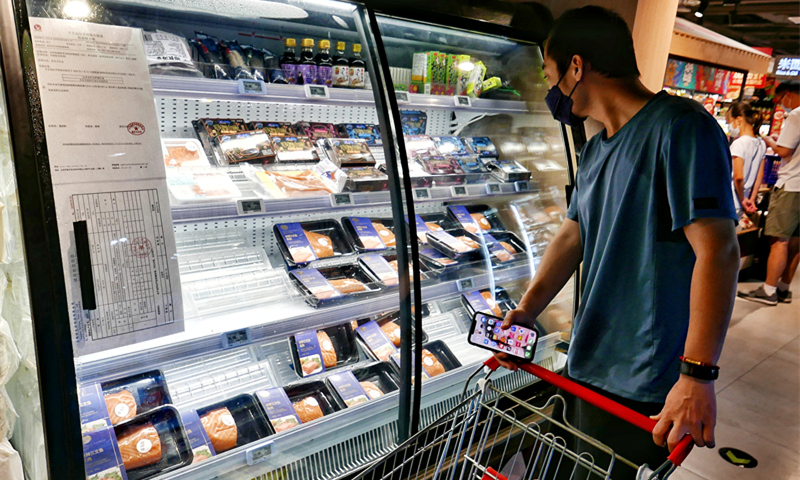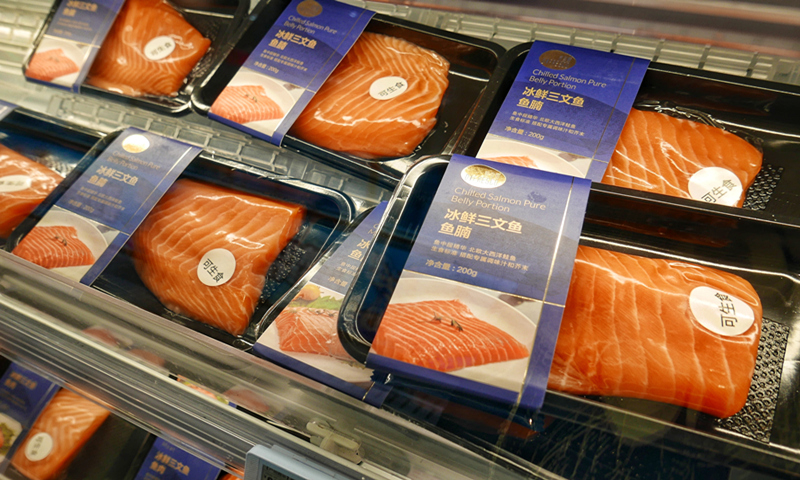Salmon is back in China
By Yin Yeping Source: Global Times Published: 2020/7/29 17:28:40
Market for fish linked to Beijing outbreak begins recovery

Fresh salmon at an Alibaba's Hema Fresh store in Beijing's Shijingshan District on July 28, 2020 Photo: Li Hao/GT
Restaurants and stores in China are putting salmon back on sale as consumer confidence picks up nearly two months after Beijing's second COVID-19 outbreak at the Xinfadi wholesale market, with some imported salmon dealers seeing up to 50 percent sales increases month-on-month in July.
Guo Xiaodong, an industry expert and investor of Cun Shang Yi Wu, a famous Japanese restaurant chain, told the Global Times on Wednesday that at least 30 out of the chain's 40 restaurants nationwide have now resumed sales of fresh salmon, which is imported from Norway, and the remaining branches are gradually putting salmon back on their menus.
"We have resumed salmon sales since July 18, and our salmon purchase quantity has now recovered 50 to 60 percent from June," Guo said, adding that as many loyal customers are returning for fresh salmon dishes, a full resumption can be expected within one or two months.
In order to assure consumers of food safety, nucleic acid testing is required by Chinese customs and suppliers before salmon is sent to restaurants and stores, according to Guo.
Liu Dong, manager of a Japanese restaurant in Beijing, told the Global Times on Tuesday that salmon sashimi has been back on the restaurant's menu since last week, having been unavailable for almost two months.
Seafood and other cold chain products came under fire in early June after coronavirus was found on a chopping board that was used to cut salmon at the Xinfadi market.
"Salmon sashimi and other fresh seafood were popular dishes before the outbreak, and we decided to resume them as salmon has already been proven safe to eat," Liu said, adding that notices have been put up around the restaurant to provide information such as product sources and nucleic acid test certification.
Although diners who order sashimi now account for just 10 percent of all customers, compared to the usual 50 percent, the situation is already better than the manager had expected.
"We are also offering some new dishes with cooked salmon to provide alternatives for salmon lovers who are less confident about eating raw fish," said Liu.
Imports rising
A customer service representative of online fresh whole salmon store Xian You Hui Ju said on Wednesday that the store's sales volume is relatively high, with up to thousands of orders received each day.
"Our salmon is imported from the Faroe Islands, and every batch of salmon has gone through compulsory nucleic acid tests," said the customer service representative. The test certificates are uploaded to the company's website for public inspection.
In order to boost sales, several online stores are offering limited discounts or promotions for fresh salmon.
Imported salmon accounts for 85 percent of the domestic salmon market, with at least 100,000 tons imported annually, according to the China Aquatic Products Processing and Marketing Alliance (CAPPMA). And as retailers are resuming their salmon purchases, overseas exports are experiencing a slow but steady rise.
Norway, a major exporter and producer, exported 119 tons of fresh salmon to China in the first week of July, down 76 percent year-on-year but up from 58 tons the previous week, statistics from the Norwegian Seafood Council showed.
Weng Qiang, purchasing manager at Sunkfa Holding Group, a leading Beijing-based seafood company, told the Global Times that the industry as a whole is down compared to last year, but there has been a slight recovery.
"The import volume in July rose 50 percent from June, against the backdrop of a resuming salmon market," Weng said, adding that the company is now importing new batches of fresh salmon from countries like Australia, Chile and Norway after a short suspension.
Full recovery in time
The resumption of the salmon market is within expectations as there have been no new COVID-19 cases related to salmon since the Xinfadi outbreak, and exporters have been asked to provide nucleic acid test certificates for products before they are delivered to China, Cui He, president of the CAPPMA, told the Global Times.
Cui said that even after Northeast China's Dalian on July 22 reported a new COVID-19 cluster linked to a seafood processing company, the seafood market has seen little impact, which could be eliminated in 10 days.
Although there is no evidence that the novel coronavirus can be transmitted through food, it will still take time to restore the general public's confidence in imported seafood, analysts said.

Fresh salmon at an Alibaba's Hema Fresh store in Beijing's Shijingshan District on July 28, 2020 Photo: Li Hao/GT
Zhao Jingqiao, executive director of the Service Economy and Catering Sector Research Center under the Chinese Academy of Social Sciences, told the Global Times that Japanese restaurants account for a major proportion of salmon consumption in China, and some restaurants remain hesitant about re-introducing the fish on their menus.
"After all, the market as a whole cannot afford repeated cases. And many consumers are also hesitant about consuming imported salmon as the pandemic is ongoing overseas," said Zhao.
Although the market is seeing positive signs of resumption, industry insiders hope for more promising prospects.
Fan Xubing, president of seafood importer Beijing Seabridge Marketing, told the Global Times that in the second half of the year, sales of imported seafood in China are expected to be 20 to 30 percent lower than in the same period last year.
"The timing of a full recovery depends on consumer confidence in seafood," Fan said.
The wide-ranging impacts of the unprecedented COVID-19 pandemic are set to take a heavy toll on market participants all along the supply chain this year, said Food and Agriculture Organization (FAO), adding that China, a fast developing market of salmon with enormous potential, continues to be an important target for salmon exporters.
Meanwhile, large-scale cancellation of international flights has directly affected trade in some high-end products which are transported by air, such as fresh Norwegian and Chilean salmon destined for China and the US, according to FAO.